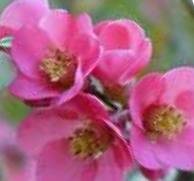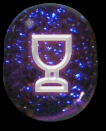Quince
The Quince may well be included among remedial Herbal Simples because of the virtues possessed by the seeds within the fruit. The tree is a native of Persia and Crete; bearing a pear-shaped fruit, golden yellow when gathered, and with five cells in it, each containing twelve closely packed seeds. These are mucilaginous when unbroken, and afford the taste of bitter almonds. When immersed in water they swell up considerably, and the mucilage will yield salts of lime with albumen.
Added Dec 1, 2010
| 6,715 Reads
The Quince (Cydonia) is cultivated sparingly in our orchards for the sake of its highly fragrant, and strong-smelling fruit, which as an adjunct to apples is much esteemed for table uses. Bandoline is the mucilage of Quince seeds to which some Eau de Cologne is added: and this mixture is employed for keeping the hair fixed when dressed by the Coiffeur. The mucilage of Quince seeds is soothing and protective to an irritated or inflamed skin; it may also be given internally for soreness of the lining mucous membranes of the stomach and bowels, as in gastric catarrh, and for cough with a dry sore throat. One dram of the seeds boiled slowly in half-a-pint of fresh water until the liquor becomes thick, makes an excellent mucilage as a basis for gargles and injections; or, one part of the seeds to fifty parts of rosewater, shaken together for half-an-hour. From growing at first in Cydon, now Candia, the tree got its name Cydonia: its old English title was Melicotone; and in ancient Rome it was regarded as a sacred fruit, being hung upon statues in the houses of the great. Now we banish the tree, because of its strong penetrating odour, to a corner of the garden. Lord Bacon commended "quiddemy," a preserve of Quinces, for strengthening the stomach; and old Fuller said of this fruit, "being not more pleasant to the palate than restorative to the health, they are accounted a great cordiall." Jam made from the Quince (Malmelo) first took the name of Marmalade, which has since passed on to other fruit conserves, particularly to that of the Seville Orange. In France the Quince is made into a compôte which is highly praised for increasing the digestive powers of weakly persons. According to Plutarch Solon made a law that the Quince should form the invariable feast of the bridegroom (and some add likewise of the bride) before retiring to the nuptial couch. Columella said: "Quinces yield not only pleasure but health." The Greeks named the Quince "Chrysomelon," or the Golden Apple; so it is asserted that the golden fruit of the Hesperides were Quinces, and that these tempted Hercules to attack their guardian dragon. Shakespeare makes Lady Capulet when ordering the wedding feast, "Call for dates, and Quinces in the pastry." In Persia the fruit ripens, and is eaten there as a dessert delicacy which is much prized. If there be but a single Quince in a caravan, no one who accompanies it can remain unconscious of its presence. In Sussex at one time a popular wine was made of Quinces. They are astringent to stay diarrhoea; and a syrup may be concocted from their juice to answer this purpose. For thrush and for excoriations within the mouth and upper throat, one drachm of the seeds should be boiled in eight fluid ounces of water until it acquires a proper demulcent mucilaginous consistence. "Simon Sethi writeth," says Gerard: "that the woman with child that eateth many Quinces during the time of her breeding, shall bring forth wise children, and of good understanding." Gerard says again: "The marmalad, or Cotiniat made of Quinces and sugar is good and profitable to strengthen the stomach that it may retain and keep the meat therein until it be perfectly digested. It also stayeth all kinds of fluxes both of the belly, and of other parts, and also of blood. Which cotiniat is made in this manner. Take four Quinces, pare them, cut them in pieces, and cast away the core: then put into every pound of Quinces a pound of sugar, and to every pound of sugar a pint of water. These must be boiled together over a still fire till they be very soft: next let it be strained, or rather rubbed through a strainer, or a hairy sieve, which is better. And then set it over the fire to boil again until it be stiff: and so box it up: and as it cooleth, put thereto a little rose water, and a few grains of musk mingled together, which will give a goodly taste to the cotiniat. This is the way to make marmalad." "The seed of Quinces tempered with water doth make a mucilage, or a thing like jelly which, being held in the mouth is marvellous good to take away the roughness of the tongue in hot burning fevers." Lady Lisle sent some cotiniat of Quinces to Henry the Eighth by her daughter Katharine. They were reputed a sexual stimulant. After being boiled and preserved in syrup, Quinces give a well known pleasant flavour to apple pie. As the fruit is free from acid, or almost so; its marmalade may be eaten by the goutily disposed with more impunity than that made with the Seville orange. An after taste suggestive of garlic is left on the palate by masticating Quince marmalade. In the modern treatment of chronic dysentery the value of certain kinds of fresh fruit has come to be medically recognised. Of these may be specified strawberries, grapes, fresh figs, and tomatoes, all of which are seed fruits as distinguished from stone fruit. It is essential that they shall be absolutely sound, and in good condition. Dr. Saumaurez Lacy, of Guernsey, has successfully practised this treatment for many years, and it has been recently employed by others for chronic dysentery, and diarrhoea, with most happy results.
Added Dec 1, 2010
| 6,715 Reads
Share The Magic ...
The GoE MONEY!!! Course - A Course In Real MONEY MAGIC!
|





















